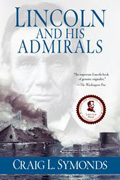
Co-winner of the 2009 Lincoln Prize, Lincoln and His Admirals, provides an original account of how Lincoln managed the men who ran the naval side of the Civil War, and how the activities of the Union Navy affected the course of the war. Abraham Lincoln began his presidency as well as the war with virtually no knowledge of naval affairs, lacking both exposure and interest given his upbringing in the Midwest. Despite his inexperience, he quickly came to preside over the largest national armada of the century, not eclipsed until World War I. Craig L. Symonds demonstrates the larger political and diplomatic impact of naval operations and offers fresh insight into Lincoln's overall strategic vision,showing how it ultimatelydetermined the outcome of the war and the young nation's fate. Abraham Lincoln began his presidency admitting that he knew "but little of ships," but he quickly came to preside over the largest national armada to that time, not eclipsed until World War I. Written by naval historian Craig L. Symonds, Lincoln and His Admirals unveils an aspect of Lincoln's presidency unexamined by historians until now, revealing how he managed the men who ran the naval side of theCivil War, and how the activities of the Union Navy ultimately affectedthe course of history. Beginning with a gripping account of the attempt to re-supply Fort Sumter--a comedy of errors that shows all too clearly the fledgling president's inexperience--Symonds traces Lincoln's steady growth as a wartime commander-in-chief. Absent a Secretary of Defense, he would eventually become de facto commander of joint operations along the coast and on the rivers. That involved dealing with the men who ran the Navy: the loyal but often cranky Navy SecretaryGideon Welles, the quiet andreliable David G. Farragut, the flamboyant and unpredictable Charles Wilkes, the ambitious ordnance expert John Dahlgren, the well-connected Samuel Phillips Lee, and the self-promoting and gregarious David Dixon Porter. Lincoln was remarkably patient; he often postponed critical decisions until themomentum of events made the consequences of those decisions evident. But Symonds also shows that Lincoln could act decisively. Disappointed by the lethargy of his senior naval officers on the scene, he stepped in and personally directed an amphibious assault on the Virginia coast, a successful operation that led to the capture of Norfolk. The man who knew "but little of ships" had transformed himself into one of the greatest naval strategists of his age.Co-winner of the 2009 Lincoln PrizeWinner of the 2009Barondess/Lincoln Prize by the Civil War Round Table of New YorkJohn Lyman Award of the North American Society for Oceanic HistoryDaniel and Marilyn Laney Prize by the Austin Civil War Round TableNevins-Freeman Prize of the Civil War Round Table of Chicago AcknowledgementsIntroduction1861: GETTING UNDER WAY 1. "What Have I Done Wrong?" Lincoln and the Fort Sumter Crisis 2. "A Competent Force" Lincoln and the Blockade 3. "No Affront to the British Flag" Lincoln and the Trent Affair1862: CHARTING A COURSE 4. "I Wont Leave Off Until It Fairly Rains Bombs" Lincoln and the RiverWar 5. "It Strikes Me There's Something In It" Lincoln and the Monitor 6. "We Cannot Escape History" Lincoln and the Contraband1863: TROUBLED WATERS 7. "The Peninsula All Over Again" Lincoln, Charleston, and Vicksburg 8. "I Shall Have to Cut This Knot" Lincoln as Adjudicator 9. "Peace Does Not Appear So Distant as it Did" Lincoln and Wartime Politics1864: FULL SPEED AHEAD 10. "It Becomes Immensely Important to Us to Get the Cotton" Lincoln and the Red River Campaign 11. "A Vote of Thanks" Lincoln and the Politics of Promotion 12. "I Must Refer You to General Grant" Lincoln and the Fort Fisher Expedition1865: FINAL HARBOR Epilogue: "Thank God I Have Lived to See This"Abbreviations Used in NotesNotesBibliographyIndex
- ISBN: 978-0-19-975157-0
- Editorial: Oxford University
- Encuadernacion: Rústica
- Páginas: 448
- Fecha Publicación: 28/04/2011
- Nº Volúmenes: 1
- Idioma: Inglés
